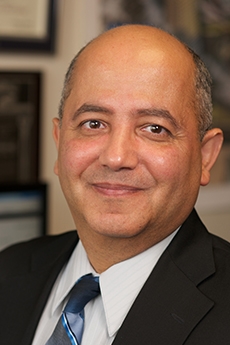As a leading expert in structural engineering, Professor Sameh Badie plays a pivotal role in shaping the precast concrete industry, contributing to major publications developed by the Precast/Prestressed Concrete Institute (PCI). Recognized for his long and continuous service to the institute and significant impact on the industry, Badie was named a PCI Fellow! PCI will present him with this esteemed title, granted to only 10 individuals annually, at their next upcoming convention in February 2025.
This unique field offers fast and cost-effective construction, utilizing precast prestressed concrete components produced offsite that are then transported to and installed at the construction site, which Badie likened to assembling Legos. As a technical institute, PCI certifies precast concrete manufacturers, conducts research projects with universities and laboratories nationwide, hosts annual conferences and committee meetings, and disseminates the most up-to-date knowledge on precast concrete structures and systems through various periodicals, manuals, and reports.
After receiving his doctoral degree from the University of Nebraska in 1997, Badie joined PCI as a professional member. Now with over 25 years of experience developing innovative prestressed and precast concrete systems for bridges, his research contributions have proven crucial to PCI’s secondary role as an industry trade association.
“At the time I joined, the institute was developing what we call today the PCI Bridge Design Manual. This manual now has about 22 chapters that cover everything about the production and design of pre-stressed, precast concrete structures. The 1st and 2nd editions of this manual were done by a small group of about 50 people, and I was one of them,” said Badie. In 2011, PCI awarded Badie the Leslie D. Martin Award of Merit in recognition of his significant contribution.
Badie’s work is consistently translated into resources for engineers and academics worldwide. It’s also used to justify changes in industry standards, such as his experimental validation of a new full-depth prestressed, precast deck panel system for highway bridges, which led to some significant changes in AASHTO LRFD Bridge Design Specifications.
Other key PCI publications Badie has co-authored include the state-of-the-art report on Full-Depth Precast Concrete Bridge Deck Panels, the PCI-FHWA eLearning courses, and the 9th edition of the PCI Industry Handbook, which will be released in 2025. His membership in PCI’s Committee on Bridges, the Industry Handbook committee, and other PCI technical committees also allow him to network with fellow structural engineers and academics, leading to collaborative projects funded by agencies like the Transportation Research Board.
Badie has won the PCI Young Educator Award for his efforts in educating and recruiting young engineers to the precast industry. At GW Engineering, he’s developed six courses in precast, reinforced, and prestressed concrete structures, including the prestressed concrete course offered every Spring in which he uses the PCI Industry Handbook as the primary textbook, as it covers all aspects of the design, fabrication, and erection of these structures. In his bridge design course offered every other Fall, he uses the PCI Bridge Design Manual.
“Usually, in my classes, I encourage our students in the Civil and Environmental Engineering Department to join professional organizations like PCI. The more our students get involved with this institution, the more in-depth knowledge they’ll have about what they will do in their careers for maybe the next 30 to 40 years,” Badie said.
Through the seamless integration of research, knowledge dissemination, and education, Badie’s work advances the field of precast concrete, producing innovative systems that improve durability and performance. As a PCI Fellow, he remains committed to engaging with the institute and inspiring the next generation of engineers.


